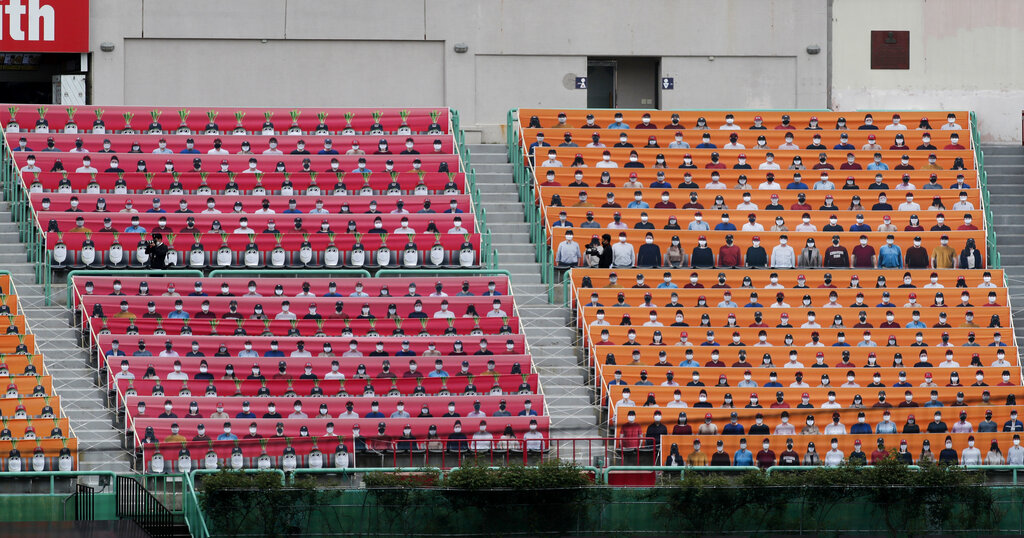
Spectators’ seats are covered with pictures of fans before the start of a regular season baseball game between Hanwha Eagles and SK Wyverns in Incheon, South Korea, Tuesday, May 5, 2020. South Korea’s professional baseball league start its new season on May 5, initially without fans, following a postponement over the coronavirus. (AP Photo/Lee Jin-man)
SEOUL, South Korea— Cheerleaders danced beneath rows of empty seats and umpires wore protective masks as a new baseball season began in South Korea.
After a weeks-long delay because of the coronavirus pandemic, a hushed atmosphere allowed for sounds like the ball hitting the catcher’s mitt and bats smacking the ball for a single or double to echo around the stadium.
There were faces in the stands at a game on Tuesday — pictures placed in the seating — because fans aren’t allowed into the venues, at least for now.
Instead, it was easy to hear players cheering and shouting from dugouts. And it was a relief to fans watching from home in a country that’s now attempting a slow return to pre-COVID-19 normalcy amid a waning caseload.
The country’s professional soccer leagues will kick off Friday, also without spectators in the stadiums.
As one of the world’s first major professional sports competitions to return to action amid the pandemic, the Korea Baseball Organization has employed various preventive measures aimed at creating safe playing environments.
Players and coaches will go through fever screenings before entering stadiums, while umpires and first- and third-base coaches must wear masks during games. Players are prohibited from high-fiving teammates or signing autographs. Chewing tobacco was banned to prevent spitting. Masks and latex gloves will be required at training facilities.
Fans will be barred from games until the KBO is convinced the risks of infections have been minimized. If any member of a team tests positive for the coronavirus at any point of the season, the league will be shut down for at least three weeks.
On Tuesday, teams tried to create a festive atmosphere in the empty stadiums.
In a game in the capital, Seoul-based LG Twins opened against crosstown rival and defending champion Doosan Bears at Jamsil Stadium, where the outfield seats were decked with huge banners of the Twins’ cheering slogans.
At Incheon, SK Wyverns imitated a home crowd by covering their outfield seats with rows of horizontal banners showing faces of fans wearing Wyverns caps and masks as they hosted the Daejeon-based Hanwha Eagles.
In Daegu, the city worst hit by the virus, the home team Samsung Lions used their huge scoreboard to play video messages from players, celebrities and fans thanking doctors and medical staff fighting the outbreak, which overwhelmed the city’s hospital capacities in late February and March before slowing in recent weeks. The Lions’ game against the Changwon-based NC Dinos was scheduled to be broadcast on ESPN.
A full season of baseball seemed doubtful in early March when South Korea was reporting around 500 new virus infections a day, forcing the KBO to postpone its March 28 season openers.
But South Korea reported just three new cases on Tuesday, its lowest daily jump since infections surged in late February. Experts credit the downward trend to tightened border controls and active efforts to test and isolate virus carriers and trace their contacts, using medical, banking and immigration records and location information provided by police and telecommunications companies.
Officials have started relaxing social distancing guidelines and are preparing to reopen schools, starting with high-school seniors on May 13.
Barring any virus-related suspension, the KBO plans to maintain a 144-game regular season schedule. But it decided to scrap its all-star game and shorten the first round of the playoffs from a best-of-five to best-of-three series.

